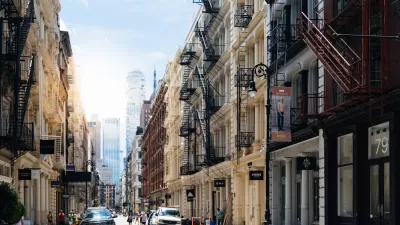Places Journal has launched a series titled "The Inequality Chronicles." Expect high-quality longform articles.
"The Inequality Chronicles" series by Places Journal began this month with a story titled "Memphis Burning," which sets the stage with a fire on February 26, 1953, when a fire burned down the home at 384 South Lauderdale Street. That kind of historic scope is reflected through the piece—which tells a history of racism as it has manifested in the housing market of Memphis since before even the beginning of World War II. The key theme that emerges from the history told by Preston Lauterbach: "Inequality is enforced in Memphis, and it always has been."
Michael Berryhill pens the second installation of the series, lending the same variety of ambitious scope and journalistic rigor to the story of East Aldine, a 15-square mile area of unincorporated land in the middle of metropolitan Houston. Berryhill details a partnership between East Aldine and Neighborhood Centers Inc., " a nonprofit group that has quietly backed Houston’s poor for more than a hundred years."
After introducing Angela Blanchard, the director of neighborhood Centers, Berryhill describes the fundamental dynamics of the partnership:
It’s tempting to say that East Aldine is Angela Blanchard’s next project, but that would be misleading. She is East Aldine’s next project. Neighborhood Centers preaches a gospel called appreciative inquiry. Instead of barging into a community and telling residents what to fix, Blanchard’s organizers listen. They identify local leaders and ask what they can do to help. While many nonprofits talk about bottom-up organizing, this one takes it to another level. “We are so fanatical about treating people with respect,” Blanchard said. “It is embedded in the culture. We train on it. We teach other people.”
If the Neighborhood Centers name and method sounds familiar, you might have read the chapter about the organization in The Metropolitan Revolution, by Brookings Institution analysts Bruce Katz and Jennifer Bradley.
Both of the articles in the series so far are highly recommended for planners and anyone else interested in tackling the complex and varied problems of inequality.
FULL STORY: Memphis Burning

Trump Administration Could Effectively End Housing Voucher Program
Federal officials are eyeing major cuts to the Section 8 program that helps millions of low-income households pay rent.

Planetizen Federal Action Tracker
A weekly monitor of how Trump’s orders and actions are impacting planners and planning in America.

Ken Jennings Launches Transit Web Series
The Jeopardy champ wants you to ride public transit.

Opinion: Transit Agencies Must View Service Cuts as Last Resort
Reducing service could cripple transit systems by pushing more riders to consider car ownership, making future recovery even less certain.

‘Smart Surfaces’ Policy Guide Offers Advice for Building and Maintaining Urban Tree Canopies
Healthy, robust tree canopies can reduce the impacts of extreme heat and improve air quality.

New Jersey Lawsuit Targets Rent-Setting Algorithms
The state of New Jersey is taking legal action against landlords and companies that engage in what the state’s Attorney General alleges is illegal rent fixing.
Urban Design for Planners 1: Software Tools
This six-course series explores essential urban design concepts using open source software and equips planners with the tools they need to participate fully in the urban design process.
Planning for Universal Design
Learn the tools for implementing Universal Design in planning regulations.
Heyer Gruel & Associates PA
Ada County Highway District
Institute for Housing and Urban Development Studies (IHS)
City of Grandview
Harvard GSD Executive Education
Toledo-Lucas County Plan Commissions
Salt Lake City
NYU Wagner Graduate School of Public Service




























